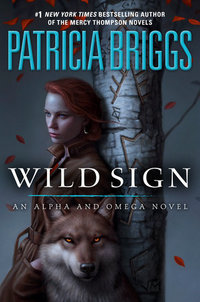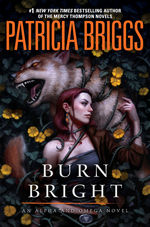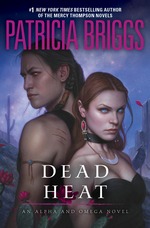I had this pretty much ready to go yesterday and the day before that, but I didn’t like what I’d written — it’s not like I disagreed with myself (I’m funny that way), but I just had gone off on a tangent and ended up writing about things I didn’t care that much about, and ignored the things I’d been thinking about since I read the book. This isn’t exactly what I meant to talk about, nor is it as clear as I wanted things to be — but it’s close enough. Hope someone gets something out of it.
—
by Patricia Briggs
Series: Alpha and Omega, #5
Hardcover, 308 pg.
Ace, 2018
Read: March 7 – 8, 2018

Anna was her father’s daughter, and her father believed in science and rational thinking. She’d been a werewolf for years now, and she still tended to think about it from a scientific viewpoint, as though lycanthropy were a virus.
Faced with a wall of briar-thorned vines straight out of a Grimms’ fairy tale, she’d never had it brought home so clearly that what she was and what she did was magic. Not Arthur C. Clarke magic, where sufficient understanding could turn it into a new science that could be labeled and understood. But a “there’s another form of power in the universe” magic. Something alien, almost sentient, that ran by its own rules-or none. Real magic, something that could be studied, maybe, but would never rest in neatly explainable categories.
I appreciated this look into Anna’s thinking. It matches up with what we’ve seen of Mercy’s take on magic, but not completely, underscoring the differences in t heir personalities and way of looking at the world.
Burn Bright takes place on the heels of Silence Fallen — Bran’s not back yet and Charles is handling things. At least as much as Leah will let him. We’ve known for quite some time that Bran’s pack is full of misfits, wolves that need extra care and attention that they probably couldn’t get elsewhere — particularly older werewolves, the type who are nearing the point where they can’t keep control. Asil is a prime example of this — but now we learn that Asil actually is an example of an older wolf who’s doing just fine and that there are a half-dozen or so living near the Marrock, but that don’t come into town or have much at all to do with anyone not Bran, Charles or a small number of specific individuals.
Now, while the Marrock is gone, someone is targeting these wolves — and all signs point to someone within the pack. Can Charles, Anna and others protect these pack members from this new threat? Can they identify the traitor in their midst, and will Charles have to kill someone he trusted to preserve the safety of all the wolves?
One thing I noticed last year doing my re-read of the Mercy and Alpha & Omega books was just how comfortable I felt in these books — that holds true here, too. It doesn’t matter about the peril being faced by Charles and Anna (or any of the rest of the pack), reading this book was a nice, relaxing time with old friends. Agatha Christie or Dorothy Sayers, she’s not, but Briggs sure writes a cozy novel. I cannot put my finger on why — if it’s something in Briggs’ style, her voice, the stories, a combination of the three — but it doesn’t matter. As long as she does that, she’ll have loyal readers.
This was a very talk-y story (and maybe all the Charles and Anna stories skew this way, but this seemed a bit more pronounced). More than once I asked “Do we need to tell this story now? Can’t we come back and chat about this later, you know, after everyone is safe?” Of course, the answer is now, and we need all the talk-y bits to get the understanding and information necessary to defeat the bad guys. Still, the author and readers know this, but Charles, Anna and the rest don’t know that and I wish they displayed a greater sense of urgency.
Most of the talk-y portions were discussing the wildlings being targeted by the mysterious (and well-armed) forces at work here. Which at least pays off in the readers getting to know them — which I greatly appreciate. The other person we get to know better is Leah, Bran’s wife and his wolf’s mate. Between these books and the Mercy novels we’ve gotten to know here a bit, but this novel fills that knowledge out. Between Leah and Chrissy (Adam’s ex- in the Mercy books) Briggs displays a real talent in writing women that you cannot stand or trust, but have enough sympathy for that you can’t just hate. They’re manipulative, conniving, and self-promoting in ways that are clearly meant to set your teeth on edge — but there’s something very vulnerable about them, too.
There’s a reveal or two later in the book that seem inevitable — only because that’s how stories work, even when (especially when?) everything is pointing in one direction, but there’s no way an author of any experience would go with something so obvious. It’s hard to get more specific while not giving away the details — but those reveals ended up leaving me dissatisfied only because I called them so early. It feels like when you’re watching a police procedural and identify the killer when the guest star makes their appearance in the first 10 minutes — sure Castle might be charming, Bones’ intern might be delightfully quirky, or Rizzoli might have some sort of compelling side-story, but the mystery part of the story is a disappointment because how is Morgan Fairchild not going to be the killer?
But the focus of the book is on the relationship between Charles and Anna, their mutual trust, the way they help each other in ways no one else can. That part of the novel is rock solid, and as long as Briggs delivers that, who’s going to complain?
I thoroughly enjoyed this one, don’t misunderstand me. And the more I learn about Bran’s pack in Montana, the more I like it and the more I want to know. Asil, as always, was a joy. But . . . the more I think about Burn Bright the less satisfying it seems, the slighter it feels. I’m glad I read it, I’ll likely gladly read it again — and I look forward to the next adventure with these two. But I think Briggs could’ve — and should’ve — done better.
—–

 This is a weekly bloghop hosted by Freda’s Voice
This is a weekly bloghop hosted by Freda’s Voice Grab a book, any book.
Grab a book, any book. Turn to Page 56 or 56% on your ereader. If you have to improvise, that is okay.
Turn to Page 56 or 56% on your ereader. If you have to improvise, that is okay. Find a snippet, short and sweet.
Find a snippet, short and sweet. Post it
Post it

![]()






